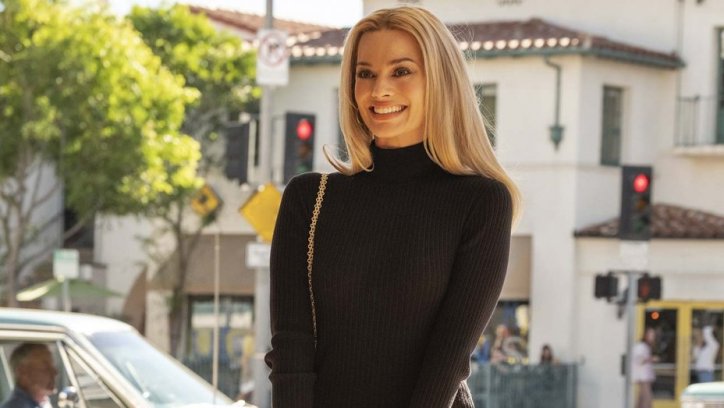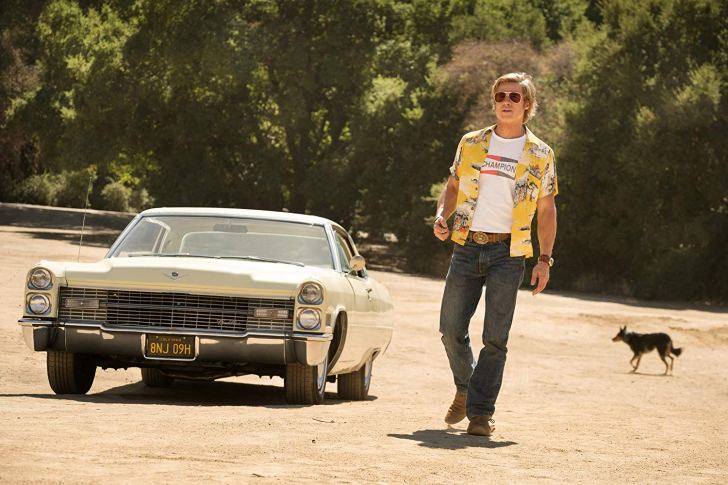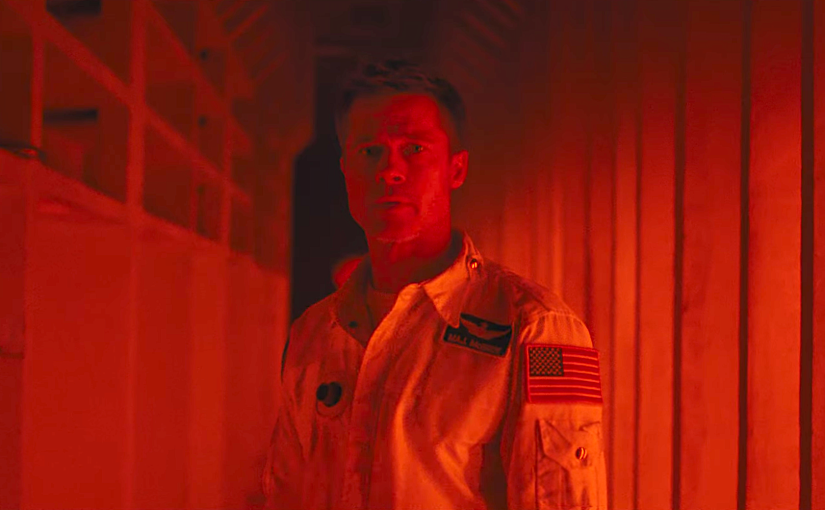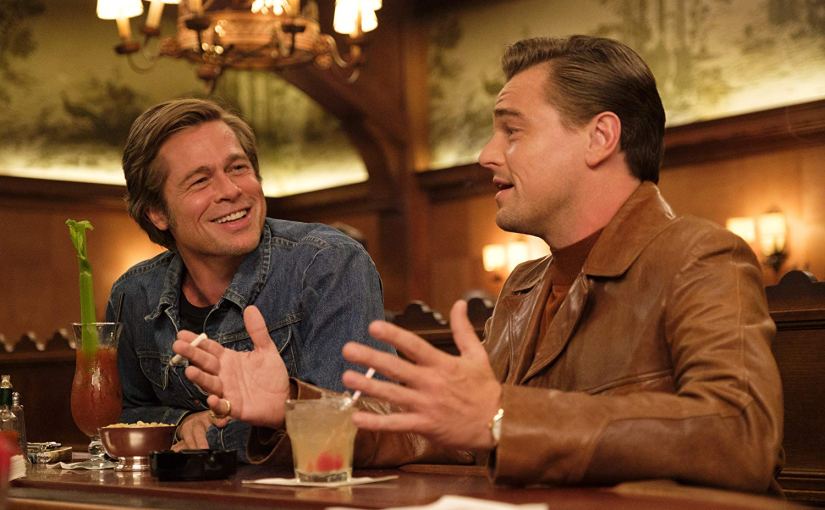Tag: Brad Pitt
Once Upon a Time in Hollywood (2019) – Review
Tarantino-tailored time capsule.
Don Draper described nostalgia as “a twinge in your heart far more powerful than memory alone”. Tarantino’s vision of a pre-Manson, sun-kissed 60s Los Angeles – illustrated with Pan Am planes, Cadillacs and neon-lit cinema dusk-scapes – transcends the reality of your experiences and radiates like a warm memory, creating a tangible sense of place that’s every bit authentic as it is irresistible. Like Scorsese’s titular twinkly Casino, QT’s city of angels is an alluring character of its own.
The filmmaker’s legacy is a complex menagerie of violent, sweary concoctions: among them is the ultra-nihilism of The Hateful Eight; the jet-black, scalped revisionism of Inglorious Basterds; the ode to Grindhouse exploitation of Death Proof; and the superfly pithiness of Reservoir Dogs. He’s famously proclaimed he’ll only make 10 films; which makes Once Upon a Time in Hollywood his ninth (counting Kill Bill as one bloody affair).
Though, contrasting expectations as his filmography draws to a close, his penultimate release doesn’t write history with lightning in Pulp (semi-)Fiction. For much of its 161-minute runtime, it’s closer in spirit to Jackie Brown; still layered with Tarantinoisms – freeze frame flashback exposition à la Hugo Stiglitz, snazzy editing and infectious tunes (particularly Los Bravos’ Bring a Little Lovin’) – but much mellower, allowing every little thread to untangle at a leisurely, captivating pace.

We open with a reel of Bounty Law, an amusingly corny western TV show, before cutting to an interview with our leads: Rick Dalton (Leonardo DiCaprio), a jading television actor; and his stunt-double Cliff Booth (Brad Pitt), who helps “carry Rick’s load”. Rick is floundering in a youthful arena; as his agent warns him (Al Pacino in a cameo powered by legend-casting), he’s playing the bad guy so the good guys can run in the industry, coming “face to face with he failure” of his career as he averts change.
Cliff on the other hand plays fiddle to Rick’s lifestyle. Without a gig next to his double, he’s yang without ying. He drives him around, picks him up, fixes his aerial – though it isn’t begrudged. The pair share a brotherly bond; while Rick’s actions may appear selfish, Cliff’s puppy-like eagerness makes their rapport particularly charming as they traverse their respective tales.
The film takes place over the course of 1969, placing up-and-coming starlet Sharon Tate (Margot Robbie) in their orbit, living next door to Rick with world-renowned director Roman Polanski (Rafal Zawierucha). The Bryan Adams timestamp is no secret coincidence; the Manson family pervade frames as Rick and Cliff cruise around, dead behind the eyes and endlessly hitchhiking back to Charles (Damon Herriman). The presence of the cult (who infamously slaughtered Sharon Tate and four others) is more of a lingering reminder of the (seemingly) inevitable than an examination from the director; perturbing the almost wistful essence that makes much of the picture feel like a reverie.
There’s a certain poeticism to OUATIH. Robert Richardson’s cinematography is beautifully textured and composed, feeling more of a tool to establish a world you’d roam than the wall-worthy pizazz of The Hateful Eight and Kill Bill. There’s no major takeaway moment of screenwriting genius like Jules’ recital of Ezekiel 25:17. Nor is there much of a plot at all – while Django Unchained‘s narrative path is rather traditional compared to Pulp Fiction‘s vastly different, groundbreaking spliced storytelling, the filmmaker’s latest flows through the trio’s vignettes like an epic rhapsody.

It’s Tarantino at his most personal. He’s crafted an immense love letter; not to racial slurs, not to feet (even though there are many, and they’re all dirty), but to the movies. Robbie’s Tate is a vessel for his addiction to the ecstasy of Hollywood – she’s an utterly joyous presence, glamorous and grin-inducing (particularly in a scene where she charms her way into a free screening of her own film, The Wrecking Crew, lapping up the audience’s reactions as she sits wide-eyed in pride).
Pitt’s Cliff embodies the problematic essence of Tarantino’s best characters, now entering his pantheon of icons. It’s an exceptional turn, one layered in stud charisma that straddles you from the off. He’s what Stuntman Mike imagines he is – take a concoction of him, True Romance‘s Floyd and Inglorious Basterds‘ Aldo, and you have Cliff. Whereas DiCaprio’s Rick is more delicate; an actor losing his feet and forever battling his own – frequently weepy – insecurities. One could read him as a representation of QT’s post-Death Proof emotional state (disheartened by the sedated critical and audience response). His first lead role since The Revenant could see him win another Oscar – though often played for laughs, the actor never forgets to imbue despair with genuine, poignant pathos.
Tones diverge without pattern; you have a hilariously silly, albeit very brief, tussle with Bruce Lee one moment, then an arse-clenching, suspense-knitted trip to the Manson family’s Spahn Ranch the next. As you hurtle towards the film’s show-stopping conclusion (smartly spawned from a meta-commentary on the violence debate), the underlying dread releases. The result is an explosion of exhilarating bloodlust that only Tarantino could orchestrate – audiences will laugh, scream and cheer till the credits roll. Also, there’s an amazing dog.
Tarantino’s penultimate film is pure movie magic; a beautifully crafted, deliriously cathartic sonnet to Hollywood’s Golden Age.
Rating: ★★★★★
Cameron Frew – @FrewFilm

